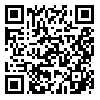BibTeX | RIS | EndNote | Medlars | ProCite | Reference Manager | RefWorks
Send citation to:
URL: http://jdisabilstud.org/article-1-2632-en.html
2- Assistant Professor, Department of Psychology, Islamic Azad University, Zanjan, Iran
3- Assistant Professor, Department of Psychology, University of Zanjan, Zanjan, Iran
Abstract
Background & Objectives: Academic achievement is one of the most important criteria for students' ability to complete their education. Among the variables related to students' academic achievement are social acceptance and a sense of belonging at school. Social acceptance is a personality trait that arises during the healthy development of human beings, which includes accepting circumstances, being accountable, and taking on the tasks required of the individual. A sense of belonging at school contributes to the student's academic progress. Active participation in school activities affects students' learning and motivation. A low sense of belonging at school leads to academic failure and eventually drop out. This study aimed to determine the relationship between academic achievement and social acceptance by mediating school belonging in the 10th–grade male students in District 2 of Qazvin City, Iran.
Methods: The current research was of the correlational and path analysis type. The statistical population of this study comprised all male students of the 10th grade studying in district two schools of Qazvin in the academic year of 2019–2020 (N=738). Hooman (2007) emphasized that the criterion for determining the sample size in the structural equation modeling is 10–15 people for each obvious variable, and at least 200 people are enough. So, in the present study, a sample size of 200 students was selected by multi–stage cluster random sampling. The inclusion criteria were as follows: 10th–grade male student of district 2 of Qazvin City, and answering all the questions in the questionnaires. The exclusion criterion was not fully answering all the questions of the research questionnaire. Sense of Belonging to School Questionnaire (Barry et al., 2004), Social Acceptance Scale (Crowne & Marlowe, 1960), and Academic Achievement Questionnaire (Saatchi, 2010) were used to collect study data. Data inferential analysis was performed using the Pearson correlation and path analysis with LISREL version 10.2 and SPSS version 24 software. A significance level of 0.05 was used for all statistical tests.
Results: The relationships between social acceptance and academic achievement (r=0.28), social acceptance and a sense of belonging at school (r=0.23), and academic achievement and a sense of belonging at school (r=0.38) were significant (p<0.05). Path coefficients between social acceptance and academic achievement (p=0.004, β=0.139), between social acceptance and a sense of belonging at school (p=0.009, β=0.381), and between a feeling of belonging to the school and academic achievement (p=0.001, β=0.222) were direct and significant. Also, an indirect and significant relationship was observed between social acceptance and academic achievement through the mediation of a sense of belonging at school (p=0.011, β=0.085). The proposed research model fit well based on various indicators (RMSEA=0.001, GFI=0.999, CFI=0.999, TLI=0.999).
Conclusion: Based on the research findings, social acceptance has a positive relationship with academic achievement and a sense of belonging at school, which mediates between social acceptance and academic achievement.
| Rights and permissions | |
 |
This work is licensed under a Creative Commons Attribution-NonCommercial 4.0 International License. |



